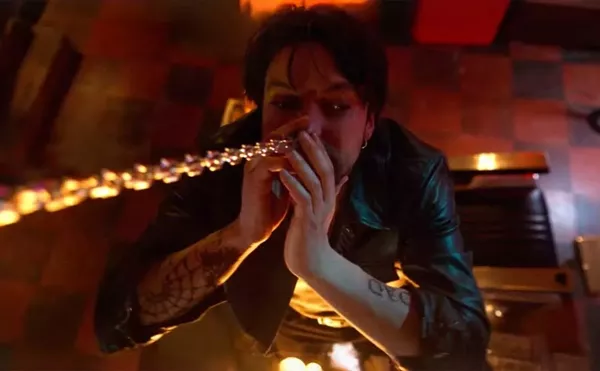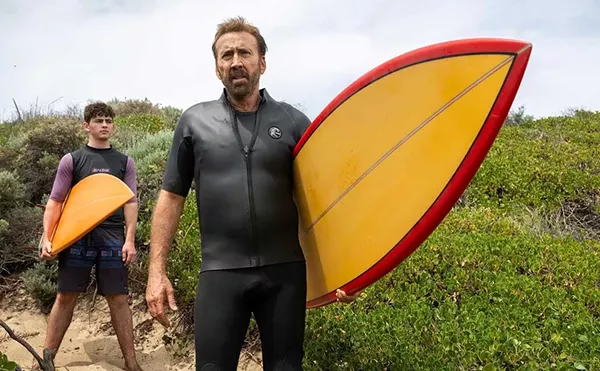
Audio By Carbonatix
[
{
"name": "GPT - Leaderboard - Inline - Content",
"component": "35519556",
"insertPoint": "5th",
"startingPoint": "3",
"requiredCountToDisplay": "3",
"maxInsertions": 100,
"adList": [
{
"adPreset": "LeaderboardInline"
}
]
}
]
In art as in life, you never forget your first time. At least that's how the saying goes. There are no doubt countless gay men who would be more than happy to forget their first times, filled as they often are with testosterone-induced grappling, awkward probing and the acidic tang of post-coital doubt and self-loathing. Sure, straight folks encounter many of the same problems. But factor in the shame, the seclusion and the bodily self-ignorance of the garden-variety queer boy, and they've got nothing on us. If you're unfortunate enough to have been born into a sexual minority, the first time is the hurdle you strive to leave far, far behind you.
But ask these same men about the first time they glimpsed even the slightest hint of same-chromosome action on a movie or television screen, and you'll get some of the most vivid recollections imaginable. And, no, they won't describe one of those crappy love-triangle rom-coms, usually featuring Matthew Perry or a Baldwin brother, in which the jowly, beer-bonging straight dude plants a suction-cup "kiss" on the gay roomie in order to somehow win over the sorority girl of his dreams. Also, for all but the most brazenly advanced — i.e., those young enough to have been weaned on the teat of the Internet — that first sighting won't be via gay porn. Until recently, gaining access to some decent hardcore action was an adventure worthy of Indiana Jones, one filled with fluorescent-lit video store back rooms, judgmental, pimply faced clerks from your graduating class and the ever-present potential for an embarrassingly loud reminder that you owe a late fee on Pokin' in the Boys' Room or Humping Iron.
No, the jolt of recognition you get from seeing two men lock lips, casually embrace, or shoot each other even the smallest knowing glance is the sort that can only come from years and years of exposure to nothing but the most blandly hetero programming imaginable. Hollywood relies upon Clockwork Orange-style conditioning designed to reinforce its theory of sexual relativity, otherwise known as "Meg Ryan plus Tom Hanks divided by distance equals true romance." To mess with that is to undermine the foundation on which movies are made, although that doesn't mean that a certain portion of us — 10 percent, if you believe the numbers — get off on something else entirely.
For some, their first peek at a life more fabulous might have been the sepia-toned spectacle of creepy old Dirk Bogarde lusting after the Peter Frampton-esque Bjorn Andrésen in the early '70s adaptation of Death in Venice, which seemed to be in heavy rotation on late-night basic cable for years. Or maybe it was Hugh Grant, with his floppy hair and self-sure grin, playing the agonizingly "straight" undergrad cocktease in the starched-collar period film Maurice; almost a decade later, Jude Law would make a name for himself much the same way, tormenting the brilliant Stephen Fry in Wilde.
Would either Law or Grant have become as popular had they not made a conscious effort to appeal to a gay fan base first? From jeans to drugs to chest-hair length, gay men have always been among the foremost tastemakers in popular culture; sorry, girls, but if you have a crush on a star, chances we've scaled that mountain first, had our way with him and are ready to move on.
The road to international heartthrob status is paved with obscure or forgotten queer indies: Just ask Russell Crowe (The Sum of Us), Keanu Reeves (My Own Private Idaho), Ewan MacGregor (The Pillow Book, Velvet Goldmine), Daniel Craig (playing delectable rough trade in Love Is the Devil, a mode he revisited last year in the "other" Capote movie Infamous) or Colin Farrell (whose Vietnam drama Tigerland may not have been explicitly homoerotic, but the presence of its leering gay director could be felt in every glorious nude shot). Even Zach Braff paid his dues with an unintentionally hilarious performance as a tweaked-out twink in the dreadful Broken Hearts Club, which should remain the low point of his still-young career for a while.
By and large, many of these proto-homo appearances were graciously brought to you by the UK, whose queer films have always, almost without exception, been better, hotter and more authentic than ours, regardless of the orientation of the actors and directors making them. If you came of age in the late '80s or early '90s, chances are some of the aforementioned Brits were your spank material of choice, and for good reason. From the moment Morrissey crooned the openings to "Hand in Glove" and "This Charming Man" — or maybe sooner, when the Buzzcocks assaulted the airwaves with "Orgasm Addict" — queer cinema on the other side of the Atlantic was invigorated with a punk urgency. The Smiths and Siouxie and the Banshees teamed up with enfant terrible directors like Derek Jarman, whose hyper-edited montages of crucified gay couples, post-apocalyptic queens and campy Super-8 musical numbers became the backdrop for a new sensibility, one that replaced the spacey androgyny of Bowie with a doomlike, distinctly masculine queerness.
Daniel Day Lewis and Gary Oldman showed off their swagger — not their mince — by giving towering performances in, respectively, My Beautiful Laundrette and Prick Up Your Ears, both of which offered the hope that queer culture could quite literally nestle comfortably alongside a scruffy, punk sensibility. Where the street-trash Lewis' clandestine shagging with a Pakistani laundromat owner offered some hope for bridging the culture gap, Oldman's portrayal of the brilliantly tragic playwright Joe Orton was a thrillingly seedy exploration of the toilets and back rooms of '60s London. Oldman channeled the nihilistic intensity of his turn as Sid Vicious just a year earlier, mating it with the kid-in-a-candy store impudence of a man with an insatiable appetite for sex and attention; as an actor, he hasn't done anything better since.
The New Queer Cinema movement in indie America valiantly tried to channel some of this energy for a few years in the early '90s, and out of it came the coolly austere films of Todd Haynes (Poison) and the pansexual excess of Gregg Araki (The Living End), among others. But then what happened? Did it all end with the U.S. version of Queer as Folk, which traded the wit and frank sexuality of the UK original for brainless softcore soap opera? Or maybe it was Haynes' own Velvet Goldmine, a would-be epic that ambitiously tried to resuscitate the glam era, but only succeeded in just one scene, a blissful dream sequence in which our post-adolescent hero Christian Bale points out a Bowie-like figure to his parents while shouting, "That's me! That's me!"
It's doubtful any of our current gay movies would inspire such an outburst in just-out-of-the-closet teens. Like a come stain on a bedsheet, the ejaculatory rush of early '90s gay cinema has dried up into a sticky, hardened mass, replaced by queeny romantic comedies (The Mostly Unfabulous Social Life of Ethan Green, Adam and Steve) or gross-out sex farces that try and fail to channel Pink Flamingos (Another Gay Movie, Girls Will Be Girls). Note to gay directors just out of film school: There is only one John Waters, and even he doesn't bat a thousand. Sometimes it seems like the only torchbearer left is John Cameron Mitchell, whose Hedwig and Shortbus, for all their faults, still channel the passion and energy of great queer art.
Mitchell has stated his goal is to reclaim sexuality from the realm of porn, and judging by the ever-increasing aversion to condoms in new skin flicks, he's doing impressionable gay teens a service. But surely the straight world gets a kick out of seeing a couple of studs bump uglies too, as evidenced by the throngs of moviegoers eager to see precisely how Heath and Jake would get down to business in Brokeback Mountain. One could argue that the only reason that film didn't make more money was that there wasn't enough gay sex in it.
Did Brokeback mark a turning point for homo-sex in mainstream movies, or just an opportunity for adult-film producers to come up with clever title parodies? (Bareback Mounting, anyone?) It's still too early to tell. Sometimes things have to get worse before they can get better: If American culture gets any more repressive, the righteous indignation that fueled the great gay movies of the past will come around to bite — and lick and poke and prod — us all in the ass, and we'll all be better off for it.
Michael Hasting is a film critic for Metro Times. Send comments to letters@metrotimes.com




